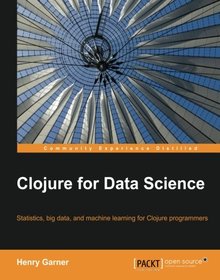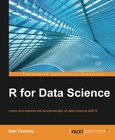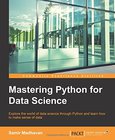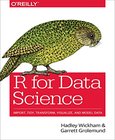Clojure for Data Science

Book Details:
| Publisher: | Packt Publishing |
| Series: | Packt |
| Author: | Henry Garner |
| Edition: | 1 |
| ISBN-10: | 1784397180 |
| ISBN-13: | 9781784397180 |
| Pages: | 608 |
| Published: | Sep 03 2015 |
| Posted: | Apr 09 2017 |
| Language: | English |
| Book format: | |
| Book size: | 9.24 MB |
Book Description:
Statistics, big data, and machine learning for Clojure programmers About This Book * Write code using Clojure to harness the power of your data * Discover the libraries and frameworks that will help you succeed * A practical guide to understanding how the Clojure programming language can be used to derive insights from data Who This Book Is For This book is aimed at developers who are already productive in Clojure but who are overwhelmed by the breadth and depth of understanding required to be effective in the field of data science. Whether you're tasked with delivering a specific analytics project or simply suspect that you could be deriving more value from your data, this book will inspire you with the opportunities-and inform you of the risks-that exist in data of all shapes and sizes. What You Will Learn * Perform hypothesis testing and understand feature selection and statistical significance to interpret your results with confidence * Implement the core machine learning techniques of regression, classification, clustering and recommendation * Understand the importance of the value of simple statistics and distributions in exploratory data analysis * Scale algorithms to web-sized datasets efficiently using distributed programming models on Hadoop and Spark * Apply suitable analytic approaches for text, graph, and time series data * Interpret the terminology that you will encounter in technical papers * Import libraries from other JVM languages such as Java and Scala * Communicate your findings clearly and convincingly to nontechnical colleagues In Detail The term "data science" has been widely used to define this new profession that is expected to interpret vast datasets and translate them to improved decision-making and performance. Clojure is a powerful language that combines the interactivity of a scripting language with the speed of a compiled language. Together with its rich ecosystem of native libraries and an extremely simple and consistent functional approach to data manipulation, which maps closely to mathematical formula, it is an ideal, practical, and flexible language to meet a data scientist's diverse needs. Taking you on a journey from simple summary statistics to sophisticated machine learning algorithms, this book shows how the Clojure programming language can be used to derive insights from data. Data scientists often forge a novel path, and you'll see how to make use of Clojure's Java interoperability capabilities to access libraries such as Mahout and Mllib for which Clojure wrappers don't yet exist. Even seasoned Clojure developers will develop a deeper appreciation for their language's flexibility! You'll learn how to apply statistical thinking to your own data and use Clojure to explore, analyze, and visualize it in a technically and statistically robust way. You can also use Incanter for local data processing and ClojureScript to present interactive visualisations and understand how distributed platforms such as Hadoop sand Spark's MapReduce and GraphX's BSP solve the challenges of data analysis at scale, and how to explain algorithms using those programming models. Above all, by following the explanations in this book, you'll learn not just how to be effective using the current state-of-the-art methods in data science, but why such methods work so that you can continue to be productive as the field evolves into the future. Style and approach This is a practical guide to data science that teaches theory by example through the libraries and frameworks accessible from the Clojure programming language.
Download Link:
Related Books:
R for Data Science
Learn and explore the fundamentals of data science with R About This BookFamiliarize yourself with R programming packages and learn how to utilize them effectivelyLearn how to detect different types of data mining sequencesA step-by-step guide to understanding R scripts and the ramifications of your changesWho This Book Is ForIf you are a data analyst who has a firm grip on some advanced data analysis techniques and wants to learn how to leverage the features of R, this is the book for you. You should have some basic knowledge of the R language and should know about some data science topics. In Detail R is a powerful, open source, functional programming language. It can be used for a wide range of programming tasks and is best suited to produce data ...
Mastering Python for Data Science
Explore the world of data science through Python and learn how to make sense of data About This Book * Master data science methods using Python and its libraries * Create data visualizations and mine for patterns * Advanced techniques for the four fundamentals of Data Science with Python - data mining, data analysis, data visualization, and machine learning Who This Book Is For If you are a Python developer who wants to master the world of data science then this book is for you. Some knowledge of data science is assumed. What You Will Learn * Manage data and perform linear algebra in Python * Derive inferences from the analysis by performing inferential statistics * Solve data science problems in Python * Create high-end visualizations using Python *...
R for Data Science
What exactly is data science? With this book, you';ll gain a clear understanding of this discipline for discovering natural laws in the structure of data. Along the way, you';ll learn how to use the versatile R programming language for data analysis.Whenever you measure the same thing twice, you get two results-as long as you measure precisely enough. This phenomenon creates uncertainty and opportunity. Author Garrett Grolemund, Master Instructor at RStudio, shows you how data science can help you work with the uncertainty and capture the opportunities. You';ll learn about:Data Wrangling-how to manipulate datasets to reveal new informationData Visualization-how to create graphs and other visualizationsExploratory Data Analysis-how to find evidence of...
2007 - 2021 © eBooks-IT.org



